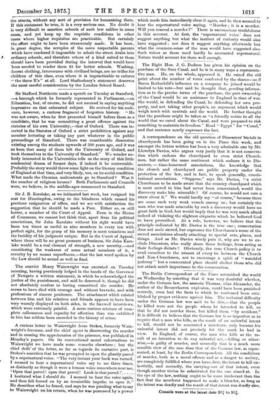A correspondence on the old question of Dissenters' btrrials in
churchyards has been going on in the Times this week, and amongst the letters written has been a very admirable one by Mr. Llewelyn Davies, who argues very justly that it is not consecra- tion which endears the churchyard to even strict Church- men, but rather the same sentiment which endears it to Dis- senters, — time-honoured associations, the knowledge that the church and churchyard are public property under the protection of the law, and in fact, to speak generally, consti- tutional associations. "Suppose," says Mr. Davies, "a strict Churchman to be made aware that the country churchyard which is most sacred to him had never been consecrated, would the discovery make him miserable ? Of course, he would not care a straw about it." We would hardly say "of course," because there are some such very weak vessels among us ; but certainly the man who was made miserable by such a discovery would have no great faith in God, but would imply that be was very much afraid indeed of violating the slightest etiquette which he believed God to have prescribed. A; a rule, however, we believe that the principle indicated by Mr. Davies is the true one ; consecration does not make sacred, but expresses the Churchman's sense of the sacred associations already attaching to special acts, places, and things. And as Mr. Davies wisely puts it, why are we to ex- clude Dissenters, who really share these feelings, from acting as their feelings dictate ? Obviously, the true Church policy is to avail ourselves to the utmost of every tie between the Church and Non-Churchmen, not to encourage a spirit of " watchful jealousy " lest a consecrated place should shelter those who did not attach much importance to the consecration.


































 Previous page
Previous page